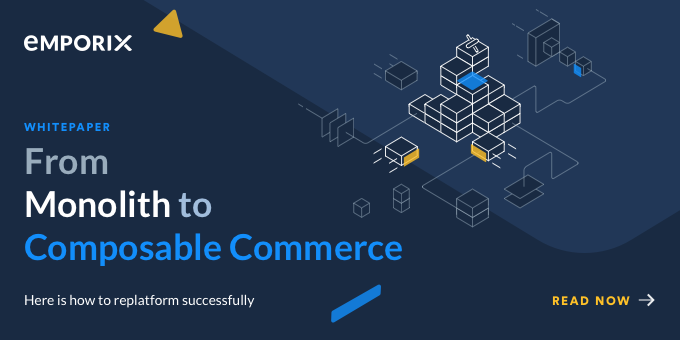Is B2B ready for the challenges of customer-centric ecommerce?
Predictably, with economies around the world plunging into lockdown, B2C ecommerce experienced record growth during the pandemic. According to data from the United Nations, global ecommerce sales jumped to $26.7 trillion in 2020, rising from 16% to 19% of overall sales. Naturally, the B2C ecommerce sector evolved to meet the demands of its customers head-on. By McKinsey’s reckoning, B2C ecommerce penetration more than doubled in the first quarter of 2020. That’s equivalent to a decade’s worth of digital commerce growth in just three months. But where is B2B ecommerce in all this?
The bleeding effect
Demand for B2C ecommerce has naturally led to innovation in the sector, with retailers working hard to ensure their technology is scalable and ready to meet customers’ demands for omnichannel convenience. This has set a new benchmark of expectation for a seamless ecommerce sales journey where customer experience is paramount.
While the customer is now accustomed to these new levels of customization and convenience experienced in their day-to-day interactions with consumer brands, inevitably the same expectations also bleed into their experiences when dealing with business transactions, but is B2B ecommerce ready to replicate this customer-centric approach yet?
In a recent article, Gartner pointed out how easy it is today for the average business buyer to gather information online, just as any consumer would do when researching a product. This effectively offsets the need for direct communication with sales teams. Even in a survey carried out before the pandemic, it was revealed that more than 70% of business customers would seek to fully define their needs and do independent research before engaging with a sales representative.
This means businesses are having to pivot toward more consumer-friendly digital channels in order to penetrate accounts, secure engagement and capture sales, just as any B2C retailer would.
B2B has unique challenges
However, while the appetite is there, it’s important to remember that B2B customers are still unique when it comes to their needs during the purchasing journey. For instance, the average B2B purchase involves seven different employee stakeholders, and the buying cycle is typically much longer and far more involved than that of an average retail buyer’s journey.
With these longer, more considered purchases, journeys have to be carefully curated and touchpoints meticulously managed to ensure expectations and timelines are met. Business customers are far more concerned with things like dispatch times, distribution deadlines and the ability to tailor orders, as this is where their pressure points lie.
For instance, a business customer might need to make on-the-fly changes to stock requests, or order various numbers of the same item or part in different sizes or colors. Different customers will have different contracts set up for the same goods but with various negotiated pricing, discounts and parameters in place. Order cycles will vary from one customer to the next, while purchase orders and approval processes may be different for each customer too. Furthermore, Industry 4.0 has introduced far greater automation, and this plays an increasing role in stock controls and order cycles that also needs to be considered within the sales process.
These are all usually features that the average B2C retailer can safely ignore, but for B2B ecommerce, the ability to heavily customize the buying contract and then factor in all of the above variables seamlessly into the digital customer journey is absolutely crucial.
While these additional considerations make B2B more complex than B2C, there’s also a huge opportunity for B2B operators that can overcome them to deliver the same level of positive digital experiences as we’ve all now become accustomed to in the consumer world. For those that do, it will become a competitive advantage that will set the business streets ahead of any that fail to invest in the digital platforms that afford these flexible features in the ecommerce journey.
The lines between customer experiences in B2C and B2B will only become more blurred, so now is the time to implement and adapt the same type of digital architecture that the world’s super retailers have been mastering over the last decade or so. And the good news is that, with the right foundations in place, it’s already possible to build bespoke ecommerce solutions that can accommodate the various needs of all different types of customers.
Composable commerce for B2B
Innovations in B2C have created the basic blueprints and building blocks from which customer-centric B2B ecommerce can grow. Now it’s up to B2B organizations themselves to take these building blocks and run with them, customizing them to suit the unique needs of their business customers in a way that can compete with the omnichannel convenience of consumerism. In short, they need composable commerce.
Composable commerce gives businesses the opportunity to pursue a ‘best of breed’ approach to their digital commerce architecture. Tailoring a solution to meet specific requirements is made possible by adopting and ‘composing’ specialist tools and features from a variety of different vendors that can be constantly updated or swapped out. There are no limitations on the number of services that can be connected on an open API platform and there is no vendor lock-in. Most importantly, the composable approach is completely flexible so that it will be able to scale and evolve in line with the business needs.
By approaching B2B commerce with the customer experience front and center, seeking ways to replicate the levels of convenience that they get when ordering online groceries or booking a table at a restaurant, there is no reason why business ecommerce cannot enjoy similar levels of growth as we have seen accelerated in consumer channels over the last eighteen months.
To find out more about Emporix, our range of composable B2B ecommerce solutions, and our partner network, get in touch today for a free consultation.

